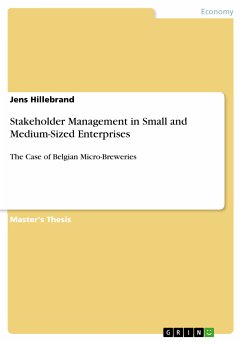Master's Thesis from the year 2009 in the subject Business economics - Business Management, Corporate Governance, grade: 17/20 (1,3), Solvay Brussels School of Economics and Management, course: International Master in Management Science, language: English, abstract: This study derives a model of stakeholder management in small and medium-sized enterprises which describes the process from the owner-managers' personal ethics to the firm's eventual engagement with its stakeholders. Following a thorough review of literature published on stakeholder theory, ethical behaviour in organizations, and small and medium-sized companies, five hypotheses are put forward on which the model is based. The results of three case studies on owner-managed micro-enterprises from the Belgian beer producing industry are used to test the validity of the model and the hypotheses. The results of the case studies on Belgian micro-breweries support the major part of the proposed SME stakeholder management model and the hypotheses it is based on. The perception of legitimate stakeholders is based on the personal ethics of the owner-manager. These are determined by the owner-manager's preference for a certain normative core and his stage of cognitive moral development. Perceived stakeholders will possess power over the company and/or have a legitimate moral or legal claim on the firm. Individual and situational moderators exist which can influence the transition from the owner-manager's personal ethic to his perception of important stakeholders. Relevant individual factors are the owner-manager's type and length of education and employment, family background, culture and nationality, as well as his locus of control. Situational influences found to be important are the views of relevant peers, (psychological) sanctions and rewards, moral intensity, and moral framing. The company's actual stakeholder management depends on whom the owner-manager perceives to be legitimate stakeholders. It may be instrumentally driven or normatively and can occur in a cooperative or competitive manner. The transition from stakeholder perception to actual stakeholder management can be affected by internal characteristics of the firm and by external environmental circumstances. Capital constraints and the need for the owner-manager to engage into 'fire-fighting' activities are discovered as influential internal characteristics. External environmental circumstances that exert an influence on the process are the specific characteristics of the brewing industry, power balances between the firms and their stakeholders, and social legislation as part of the PESTEL factors.
Bitte wählen Sie Ihr Anliegen aus.
Rechnungen
Retourenschein anfordern
Bestellstatus
Storno









